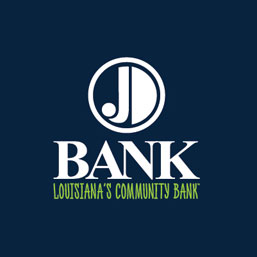JD Bancshares, Inc. Reports Financial Results for the Year Ended December 31, 2019
Jennings, Louisiana – JD Bancshares, Inc. (OTC PINK: JDVB) (the “Company”), the parent holding company of JD Bank (the “Bank”), reports its unaudited financial results for the year ended December 31, 2019.
Net income for the twelve month period ended December 31, 2019 was $8,947,846 or $5.74 per common share compared with $9,391,054 or $6.04 per common share for the twelve-month period ended December 31, 2018. Financial results for the year ended December 31, 2018 included a non-recurring payment received from our insurance company in the amount of $1,520,073, net of tax, to settle prior year litigation. Gains on the sale of securities, net of taxes, were $306,834 and $4,255 for 2019 and 2018, respectively. Excluding the effects of these non-operating items, net income and earnings per common share for the twelve-month periods ended December 31, 2019 and 2018 would have been $8,641,012 or $5.54 and $7,866,726 or $5.06, respectively. The increase in adjusted operating net income was primarily due to an increase in net interest income, partially offset by an increase in non-interest expenses and higher credit provisioning expense.
Bruce Elder, President and CEO, commented, “I am pleased to report the Company’s results for 2019. The past year has been one of change for the Company due to a shift in leadership. The management team stayed focused during the transition and produced increased adjusted operating results for the year. As 2020 comes into view, we will be focused on gaining efficiencies as the new CEO looks at the Bank and Company from a new perspective. As a team, we will blend certain processes that have served this Company well in the past with fresh concepts designed to move the Company forward for the future.”
Asset Quality
Total nonperforming assets, including loans on non-accrual status, restructured loans on non-accrual status and other real estate owned (OREO) increased to $8.7 million at December 31, 2019, from $5.8 million at December 31, 2018. Loans on non-accrual status increased to $7.7 million at December 31, 2019, from $5.1 million December 31, 2018. Other real estate owned increased to $956,000 at December 31, 2019 from $632,000 at the prior year-end, reflecting foreclosure activity net of sales and write-downs of certain real estate properties. Management performs a quarterly evaluation of OREO properties and believes their adjusted carrying values are representative of their fair market values, although there is also no assurance that the ultimate sales will be equal or greater than the carrying values.
The Bank recorded $696,000 in provisions for credit losses in the 2019 compared to $189,000 in the prior year. The allowance for loan losses (ALLL) was $6.6 million at December 31, 2019 or 1.06% of total loans compared to $6.4 million at December 31, 2018 or 1.02% of total loans. Net charge offs were $471,000 for 2019 period compared to $496,000 in 2018. We believe the current level of our ALLL is adequate; however, there is no assurance that regulators, increased risks in the loan portfolio, or changes in economic conditions will not require additional adjustments to the ALLL.
Net Interest Income
Net interest income increased to $35.3 million for the year ended December 31, 2019 from $33.0 million for the comparative period ended December 31, 2018. The change in levels of net interest income is influenced by the volume of interest-earning assets and interest-bearing liabilities and the management of rates earned and paid during each respective reporting period. The net interest margin improved to 4.40% in 2019 compared to 4.14% in 2018. The increase in margin is due to both an increase in the volume of average earning assets over the current twelve-month period as well as an increase in the yield on earning assets.
Non-Interest Income
Total non-interest income was $9.8 million for the year ended December 31, 2019 compared to $11.3 million for the prior year period. Service charges and other deposit account related income increased by approximately $120,000 year over year primarily comprised of an increase in debit card interchange and ATM surcharge revenue of $133,000, an increase in NSF fee income of $18,000, and a decline in deposit service charges of $37,000.
Revenue from mortgage loan sales and related fees increased by $42,000 in 2019 to $565,000. Although the volume of mortgages sold in the secondary market declined by approximately $2.6 million, the margin on those sales increased by 20 basis points. Fees and commissions from securities brokerage activities totaled $601,000 in 2019, reflecting a $162,000 increase over 2018. Revenue from our trust division increased to $505,000 from $478,000 for the prior year.
Gains on sale of investment securities for the year ended 2019 were $388,000 compared to $5,000 for the year ended 2018. Other non-interest income declined by $2.2 million when compared to the prior year primarily due to the receipt of insurance proceeds in the second quarter of 2018 of approximately $2.1 million to settle litigation from 2016.
Non-Interest Expense
Total non-interest expense increased to $33.7 million for the year ended December 31, 2019 from $32.7 million for the prior year period ended December 31, 2018. Compensation and benefits, the largest component of these expenses, increased marginally by $61,000 to $18.1 million for 2019. The largest increase in non-interest expense between 2019 and 2018 was in the area of data processing. Prior to late 2018, the Bank did all account processing on an in-house platform. The decision was made to outsource account processing to a data center environment. While more expensive to process in an outsourced environment, the benefits derived from data security and system uptime outweighed the additional costs. Occupancy expenses also increased in 2019 primarily in the areas of depreciation, repairs, and maintenance. Other noninterest expenses declined by $280,000 due to decreases in expenses related to OREO and FDIC insurance. These decreases were partially offset by higher expenses in the areas of professional consulting and communications.
Income tax expense declined by $241,000 to $1.7 million for the 2019 compared with $2.0 million for the prior year. The decline was due to lower pre-tax income and a reduction in the effective tax rate from 17.26% for 2018 to 16.11% for 2019. The reduction reflects the higher volume of tax-exempt municipal securities on the balance sheet for 2019.
Balance Sheet
Total assets increased by $20.3 million or 2.35% to $885.0 million at December 31, 2019 from $864.7 million at December 31, 2018. The increase in total assets was primarily in the categories of securities available for sale, interest bearing deposits at banks, and other stock equity investments which rose by $25.4 million, $2.4 million and $1.3 million, respectively. Net loans held for investment declined by $4.9 million to $614.1 million, securities held to maturity declined by $4.3 million and bank premises and equipment decreased by $1.0 million.
Total deposits increased by $13.3 million or 1.75% to $772.1 million at December 31, 2019 from $758.8 million at December 31, 2018. Money market, interest bearing checking, non-interest bearing checking, and savings account balances all increased during the year by $9.0 million, $4.8 million, $1.4 million and $100,000, respectively. Non-interest bearing checking accounts represent 34.75% of total deposit balances at year-end 2019. Time deposit and individual retirement accounts declined by $2.0 million during the year.
Stockholders’ equity increased by $7.9 million to $88.9 million at December 31, 2019 from $81.0 million at December 31, 2018, reflecting year-to-date net income, changes in accumulated other comprehensive income and dividends paid to common shareholders. The tangible equity to assets ratio increased to 9.46% at December 31, 2019 from 9.09% at December 31, 2018. There were 1,560,000 and 1,555,156 common shares outstanding at December 31, 2019 and 2018, respectively. Tangible book value per common share increased to $53.70 at year-end 2019 compared to $50.39 for the prior year-end.
Key Performance Ratios
GAAP return on average assets (ROA) and return on average equity (ROE) declined in 2019. ROA is 1.03% for the current year compared to 1.10% for 2018 and ROE is 10.38% for 2019 compared to 12.09% for the prior year-end. On an adjusted operating basis, eliminating the gains on sales of securities for both years and the insurance settlement in 2018, ROA improved in 2019 to 0.99% compared to 0.92% in 2018 and ROE declined slightly to 10.03% from 10.13%. The GAAP efficiency ratio is 74.77% for the current year compared to 73.94% for the prior year. On an adjusted operating basis, the efficiency ratio is 75.42% for 2019 compared to 77.30% for 2018.
JD Bancshares, Inc. may be accessed on its website at www.jdbank.com. The Company’s common stock symbol as traded on the OTC Pink Sheets is “JDVB”. The Company anticipates registering with the OTC-QX exchange during the first quarter of 2020.
JD Bank has been serving the citizens of southwest Louisiana since 1947 and offers a variety of financial products and services, including a trust and investment services. Securities brokerage services are made available through an affiliation with an independent broker/dealer. The Bank operates through its main office headquartered in Jennings, Louisiana, and has 21 full service branch offices located along the Interstate 10 corridor from Lake Charles to Lafayette.
Statements contained in this release, which are not historical facts, are forward-looking statements as defined in the Private Securities Litigation Reform Act of 1995. Such forward-looking statements are subject to risks and uncertainties which could cause actual results to differ materially from those currently anticipated due to a number of factors which include the effects of future economic conditions, governmental fiscal and monetary policies, legislative and regulatory changes, the risks of changes in interest rates, the effects of competition, and including without limitation to other factors that could cause actual results to differ materially as discussed in documents filed by the Company with the Securities and Exchange Commission from time to time.
(OTC PINK: JDVB)








